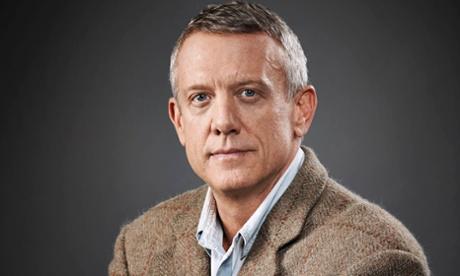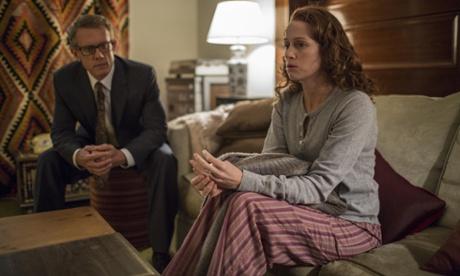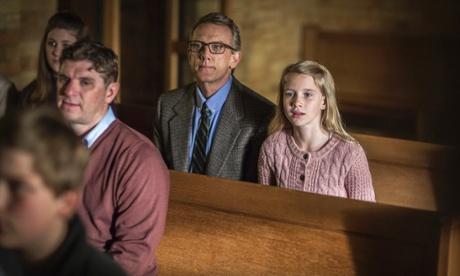|
Simon Burke on Devil's Playground: 'We couldn't avoid tackling sexual abuse'
By Amanda Meade
You’ve read reports about how the Catholic church covered up evidence involving paedophile priests. You’ve followed the hearings of the royal commission into institutional responses to child sexual abuse, established by Julia Gillard in 2012 following the shocking allegations of a cover-up in NSW. But nothing can prepare you for watching the grooming and abuse of an innocent 12-year-old boy by a respected school chaplain as it plays out dramatically in front of you. The cosy chats in the front seats of the car, the secluded spot, the threat of harm to his parents, the gift of a lighter and the unwanted caresses. If you’ve struggled to understand how it was that chaplains or parish priests who abused boys for decades were not stopped or why the church covered it up or why the victims took two decades to disclose the offences, a searing new television drama Devil’s Playground will bring you closer to an understanding. Arguably Foxtel’s most challenging Australian drama series to date, Devil’s Playground is both a sequel to Fred Schepisi’s 1976 acclaimed feature film The Devil’s Playground and an original work. The six-part drama from Foxtel, Matchbox Pictures and Screen Australia grew organically from an idea which came unexpectedly to acclaimed actor Simon Burke. Burke played the lead role of 1950s Catholic schoolboy Tom Allen in Schepisi’s coming of age film. “There is a big difference I think between the stuff we see on TV and we read in the papers every few days about institutional child abuse and seeing it imagined,” says Burke. “There’s a big difference between reading about those facts and actually sitting with the dramatic characters in a fictional setting. “It’s almost cathartic to get inside the heads of those who have suffered abuse and those who have perpetrated it.” Now 52, Burke says the story is so confronting, a “tough” friend who is a father to three children had to stop watching it. Curiously, sexual abuse was not the original idea for the film, and its concurrence with the royal commission is a coincidence. Three years ago Burke was chatting with Foxtel boss Brian Walsh about the 1976 film when he said half seriously, “Well, that would be a good idea for a television series, you know. What happened to Tom Allen 35 years later?” And Walsh said: “Yeah, well, pitch it back to me.” Burke quickly got Schepisi’s approval and brought Matchbox on board and began brainstorming a story with a team of writers. “Really all we had at the end of the movie is Tom runs away at 13 because he can’t cope with the strict environment. You’ve got all this backstory of the character but you can’t do much with a backstory that finishes when the character is 13.” Burke says it seemed too obvious to write a story about sexual abuse and they tried to steer away from the topic until it became clear it couldn’t be avoided. “We set ourselves a difficult challenge of mixing genres,” Burke tells Guardian Australia on the eve of the show’s debut on Tuesday. What ensued was a political thriller, a family drama and a deep exploration of clergy abuse in one small close-knit community in the late 1980s. The storyline was decided a good year before the former prime minister Julia Gillard announced the royal commission at the end of 2011. “But in many ways the royal commission hastened the project,” Burke says. “Because it seemed like the whole conversation was gathering momentum and [the funding body] Screen Australia biannual meeting was two weeks away and it pushed us to complete the treatment because this was something that needed to be told dramatically.” On a personal level the project is an actor’s dream. Burke gets to reprise a role which has defined his life, as well as play the role of executive producer on a drama project for the first time. “All my life as an actor – whatever I’ve done whether it’s been on stage or anything – since I was 13 years old everyone has mentioned that movie. “Because it’s a movie about coming of age and about puberty I’ve also carried around a whole generation’s feelings about puberty. “When you’re middle-aged you do look back and think about who you were then and it’s very sweet to come full circle and play a person you played at 13.” “Even though it’s three years in the making, quite honestly I literally pinch myself every day that we’re making it – with me in it – and I’m so proud of it.” Burke says Foxtel is all about pushing the boundaries of their drama productions, ever since the groundbreaking Love My Way in 2005. “With each foray they push themselves to deliver really high-end stuff like Wentworth, not just in terms of production values but in terms of audience expectations. “We are the only Australian program on showcase this year but we are alongside shows like Orange is the New Black, House of Cards, Boardwalk Empire, Game of Thrones. “HBO has been educating us as an audience; they’ve been saying, you know what, forget about a 90-minute feature film. If you want to really lose yourself in another world, try eight hours of high-end TV drama. “I almost think it’s a badge of honour for Foxtel. The networks do the big shows like Packed to the Rafters and Offspring brilliantly, the ABC is the home of telling great Australian stories. “But Foxtel says we are going to go further, we are going to place ourselves in that HBO model where reputation is staked on developing Australian shows that have to sit next to the best in the world.”
|
.
Any original material on these pages is copyright © BishopAccountability.org 2004. Reproduce freely with attribution.


